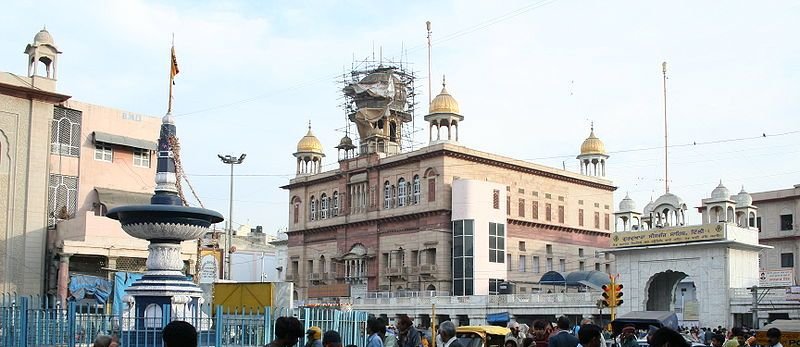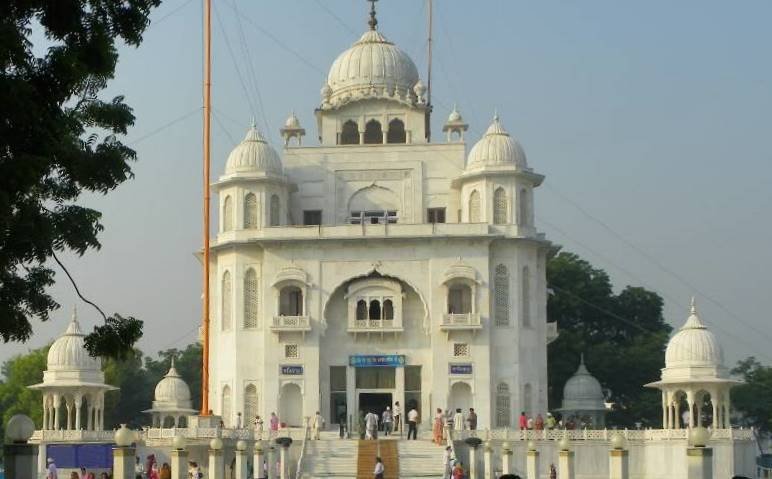 |
| Gurdwara Sis Ganj Sahib |
This Thanksgiving, I am doubly thankful. The day falls on the martyrdom anniversary of Guru Tegh Bahadur, the ninth Sikh Guru, who sacrificed his life for the protection of a people under brutal religious persecution. We cherish this principle in the United States today: "Give me your tired, your poor, your huddled masses yearning to breathe free."
In 1675, some prominent Brahmins (the highest caste Hindus) sought Guru Tegh Bahadur's help. The Mughal emperor was forcibly converting them to Islam under the threat of torturous death. Even though the Guru followed a different faith than Hinduism, he believed in everyone's right to practice one's own religion freely, a core principle of his Sikh faith. The same principle is now espoused in the First Amendment (1791) to the U. S. Constitution, allowing free exercise of religion.
The Guru advised the Brahmins to tell the emperor that they would embrace Islam if the Guru did so. He also encouraged people of all faiths to stand up to oppression and practice their faiths freely without fear. One of the Guru's hymns says: Neither frighten anyone, nor be frightened (translated from Siri Guru Granth Sahib).
As anticipated, the Guru was arrested. When lavish incentives and extreme threats failed to sway the Guru and his companion Sikhs, the Sikhs were burnt alive, boiled alive and sawed alive in front of the Guru. On still refusing to waver from his principle, the Guru himself was martyred.
 |
| Gurdwara Rakab Ganj Sahib |
Guru Tegh Bahadur's martyrdom was particularly meaningful as it reflected two important principles of the Sikh faith. The first is to stand up for not only one's own but also others' religious practices, even when one does not agree with those practices. The core principles taught by the Sikh Gurus differed from the core principles of Hinduism. The Gurus believed in One Universal God and in equality of all human beings. They did not believe in the caste system or in idol worship. They also raised their voice against many prevalent Hindu practices such as Sati (a wife immolating herself on her husband's pyre). Also, for the Gurus, the spiritual journey was the journey of the surat (consciousness) and not that of the body (e.g., involving bodily ablutions and other such actions). Even though such differences existed, and the Guru did not believe in many of the Hindu principles and practices, he sacrificed his life for the right of Hindus to practice them. This reflected the Guru's principle of free exercise of religion for people of all faiths.
The other principle manifested in the Guru's martyrdom is: "no one is an enemy, nor a stranger, I get along with all" (Siri Guru Granth Sahib). Most Mughal rulers, such as Jahangir, Aurangzeb, Zakria Khan, Yahiya Khan, Mir Manu, Ahmad Shah Abdali and others, had perpetrated brutal repression against Sikhs. At times, substantial official bounty on Sikhs' heads had driven them into deep jungles. On several occasions, Hindu leaders, such as Chandu, Gangu, Sucha Nand, Lakhpat Rai, the Hill Rajas (kings from the hilly areas), and others who had the ear of the Mughal rulers, had provoked and often directly led unprecedented repression against Sikhs, their Gurus and the young children of a Guru. However, the Sikh principles were clear -- that anyone needing help must be helped.
Despite being attacked frequently by far better equipped and manned Mughal armies, Sikhs like Bhai Ghanaiya would help and nurse even those who had been wounded in attacking the Sikhs. When Ahmad Shah Abdali took away thousands of Hindu and Muslim girls as war trophies, the Sikhs got them liberated at a tremendous cost to their own lives. These sacrifices echoed the principles enshrined in the sacrifices made by Guru Tegh Bahadur, Guru Arjan, and countless other Sikhs. In March 2003, we witnessed such compassion and principles put to practice by the U. S. marine Marco Ware, who carried to safety an injured Iraqi fighter who had just ambushed their supply convoy.
On this Thanksgiving Day, why would I feel thankful for the martyrdom of a spiritual lighthouse -- a Guru? His sacrifice underlines one of the most fundamental principles of human existence: ensuring the right of everyone to breathe free.
This message is equally, if not more, important today, when hate among various segments of our society is tearing the very fabric of our society apart. Hateful acts of one segment of society beget even stronger hateful responses. This vicious cycle is permeating more and more aspects of our life -- religion, race, class, national boundaries, political ideology, economic strains and many others. Unless the cycle of hate and vengeance is broken by love, compassion, and standing up for each other, our reasons to be thankful will be at stake.
We must go one step further in inter-faith tolerance and solidarity. Even if we do not agree with others' way of religious life, we have to not only respect it, but also defend their freedom to practice it.
We have much to be thankful for in our life. Not the least of which is the fact that we are born free. However, we can truly live free only when everyone enjoys the fundamental right to live free and to breathe free.
